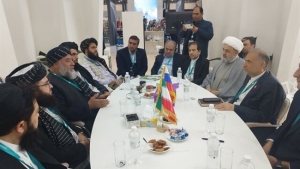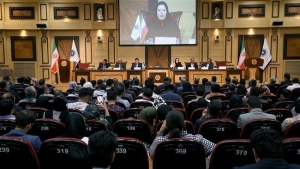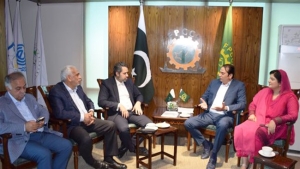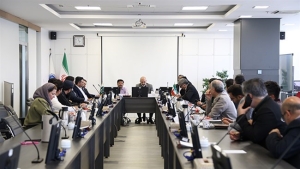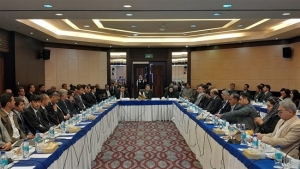Member Countries
ecocci
ECO Calendar 2024
Calendar of Events 2024
Afghanistan eyes $10 billion trade with Iran
Afghanistan’s acting minister of commerce Haji Nooruddin Azizi says his country is seeking to enhance bilateral trade with Iran to over $10 billion.
He made the remarks as he met with Iran’s Ambassador to Russia Kazem Jalali which was held on the sidelines of Kazan Forum 2024 on Friday.
The Afghan minister said that Iran’s southeastern port of Chabahar provides Afghanistan and Central Asian countries with the best access to the high seas, calling for further facilitating the transport thorough this path.
He also urged the need for Iranian border customs to work round the clock so as to give a boost to bilateral exchanges.
Afghanistan calls for more investment of Iranian private sector
Businesspeople from Afghanistan have stressed the need for Iranian private sector to make more investment in the country.
An Iran-Afghanistan Business Forum was held in the headquarters of Iran Chamber of Commerce, Industries, Mines, and Agriculture (ICCIMA) in Tehran on Monday as a major Afghan trade delegation is in the Iranian capital to attend Iran Expo 2024.
Addressing the business forum, ICCIMA Vice President Qadir Qiafeh welcomed the peace in Afghanistan after years of insecurity and said that the Iran Chamber of Commerce is ready to help the promotion of trade ties with the neighboring country.
Noting that the volume of trade between Iran and Afghanistan has reached $2 billion, he said that Afghanistan is now one of the top five destinations for Iranian products.
He urged the need for the chambers of commerce of the two countries to prepare plans for strategic measures so as to witness a growth in bilateral relations.
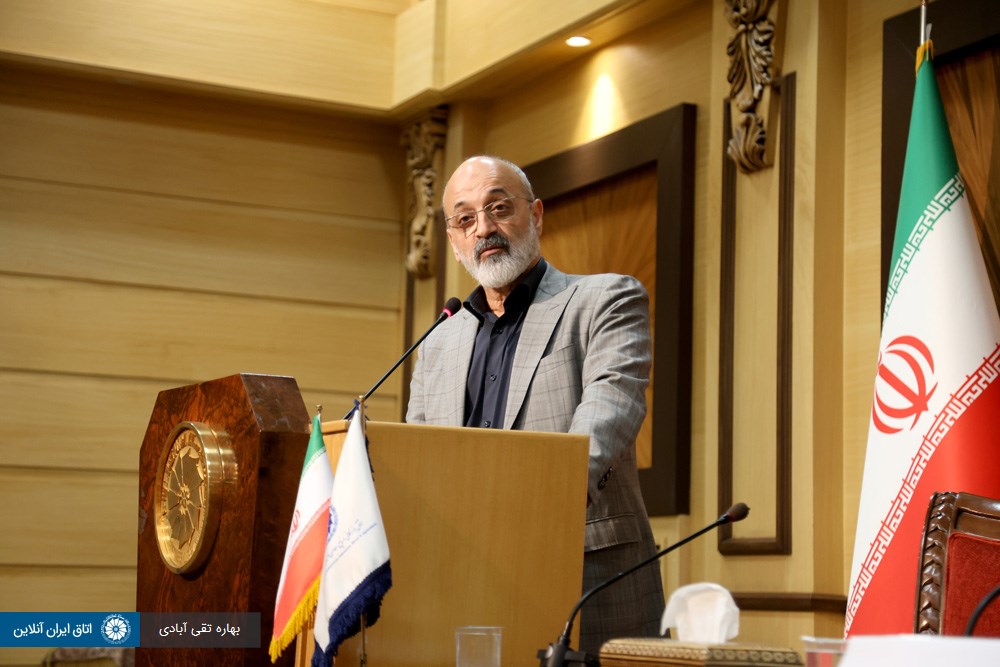
Speaking in the meantime, Deputy Head of Afghanistan Chamber of Commerce and Investment Mohammad Younus Mohmand said that Afghanistan has passed behind 45 years of war and is now witnessing security.
“By restoring trade relations with all world countries, we have increased Afghanistan's exports from $700 million to $2 billion,” he added.
He urged the need for the Iranian private sector to make investments in Afghanistan, while noting that the Chinese have a stronger presence in the country.
Mahmand stressed that his country needs Iranian experience and technology in different areas, including trade, transit, knowledge-based sector, and mines.
He added that Afghanistan railway network provides Iran with access to China and Central Asia.
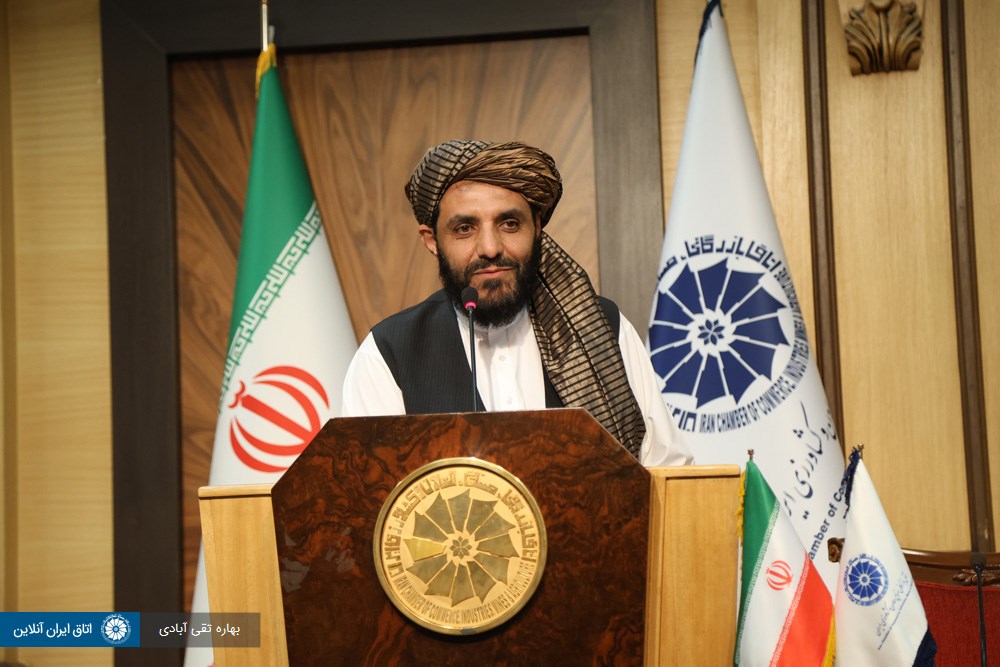
Over 1,000 Iranian companies operating in Uzbekistan
More than 1,000 Iranian companies are presently operating in Uzbekistan, it was noted in an Iran-Uzbekistan Business Forum in Tehran on Sunday.
The business forum was held as an 80-member Uzbek trade delegation is in the Iranian capital to attend Iran Expo 2024.
During the forum, both sides underlined the need for increasing the volume of trade between Iran and Uzbekistan from the current $500 million to $1 billion.
Addressing the forum, Niloofar Assadi, an official with the international affairs of Iran Chamber of Commerce, Industries, Mines, and Agriculture (ICCIMA), referred to different obstacles on the way of trade and joint investments between the two countries, urging the need for forming a council with presence of representatives from both Tehran and Tashkent.
She believed that the economies of Iran and Uzbekistan complement each other and can meet the needs of each other.
Uzbekistan’s Ambassador to Tehran Fariddin Nasriyev also addressed the forum, noting that the presence of a big Uzbek delegation in Iran Expo indicates the high willingness of the country’s business actors for more engagement in trade exchanges with Iran.
He said that the officials from both Tehran and Tashkent are focused on joint investments which requires the private sectors of the two countries to make efforts in this regard.
Noting that the Uzbekistan’s government supports any kind of investment in the country, the ambassador said that security of investment in his country is guaranteed.
He further added that the ground is prepared for exports of Iranian pharmaceuticals to Uzbekistan and even establishment of a medical production line in the county.
In the meantime, Mousa Aghaei, the chairman of Iran-Uzbekistan Joint Chamber of Commerce, said that Tehran and Tashkent have to do their best to facilitate tourism between the two countries.
Referring to obstacles hindering trade between Iran and Uzbekistan, he said that a great part of these problems have been caused by US sanctions on Tehran.
ایجاد منطقه آزاد مشترک ایران و پاکستان به توسعه روابط دو کشور منجر خواهد شد
سیدحامد عسگری، در دیدار با عاطف اکرام شیخ، رئیس فدراسیون اتاقهای بازرگانی و صنایع پاکستانر، که در حاشیه سفر هیات عالیرتبه ایرانی به این کشور انجام شد، افزود: سرمایهگذاریهای مشترک و گستردهتر دو کشور در سطح دولتی و خصوصی برای استفاده از ظرفیتهای یکدیگر ضروری است.
او با تاکید بر تلاش دولتهای ایران و پاکستان برای تسهیل روابط تجاری دو کشور، افزود: ایجاد منطقه آزاد مشترک با مشوقها و حمایتهای هر دو دولت، انگیزه مضاعفی برای همکاریهای بیشتر خواهد بود.
معاون بینالملل اتاق ایران، بر ضرورت تقویت زیرساختهای تجاری دو کشور تأکید کرد و گفت: بهبود در بخش حملونقل، گمرکات و رفع موانع تعرفهای و مشکلات نقلوانتقال پول از اولویتهای ارتباط با پاکستان است.
او تأکید کرد: با توجه به اهمیت کاهش تعرفههای گمرکی برای جهش تجارت دو کشور و گسترش تجارت از مسیرهای قانونی و همچنین بهرهمندی استانهای همجوار از فرصتهای موجود، نیاز است توافق تجارت آزاد میان دو کشور هر چه سریعتر نهایی و امضا شود.
عسگری اظهار کرد: فرصتهای تجاری و سرمایهگذاری زیادی در حوزههایی چون انرژی، تبادل فناوری، محصولات و خدمات دانشبنیان، فرآوردههای گازی و نفتی و شیمیایی، فولاد، کشاورزی و مواد غذایی و بسیاری حوزههای دیگر از جمله مصالح ساختمانی و کاشی و سرامیک، وجود دارد.
او در پایان با تقدیم دعوتنامه رئیس اتاق ایران به عاطف اکرام شیخ، از او خواست در رأس هیاتی از پاکستان، در نمایشگاه اکسپو ایران ۲۰۲۴ شرکت کند.
عاطف اکرام شیخ، رئیس فدراسیون اتاقهای بازرگانی و صنایع پاکستان نیز ایجاد منطقه ویژه اقتصادی مشترک بین پاکستان و ایران را گامی مثبت در جهت تقویت روابط اقتصادی دو کشور دانست و گفت: ایجاد منطقه اقتصادی دوجانبه در سطح دولت به دولت به نفع اقتصاد خواهد بود.
او افزود: پاکستان و ایران فرصتهای زیادی برای همکاری در بخشهای کشاورزی، تجارت، سرمایهگذاری و فناوری اطلاعات دارند و هر دو کشور نه تنها خواستار همکاریهای دوجانبه هستند، بلکه به هدف افزایش تجارت دوجانبه تا سقف پنج میلیارد دلار دست یافتهاند.
عاطف اکرام ادامه داد: روابط تجاری بین پاکستان و ایران از سالها پیش برقرار شده است اما حجم تجارت فعلی بسیار کمتر از ظرفیت آن است. نهایی کردن موافقتنامههای تجارت آزاد و ایجاد پیوندهای نهادی بین بخشهای خصوصی از مهمترین گامهای دو کشور است.
موضوع ایجاد مناطق آزاد تجاری در گذرگاههای مرزی مشترک، همکاری در بخش بهداشت دامی و همکاری در بخش استاندارد، از مهمترین اسناد همکاری اقتصادی و مورد مطالبه فعالان اقتصادی دو کشور بود که توسط همتایان پاکستانی و ایرانی بود به امضا رسید.
Iran, Pakistan urged to exercise barter trade
Economic activists from Iran and Pakistan believe that the two countries have to exercise free trade and barter trade mechanisms to further expand bilateral relations.
Iranian and Pakistani trade delegations met in a business meeting in Chamber of Commerce, Industries, Mines and Agriculture (ICCIMA) headquarters in Tehran on Saturday which took place on the sidelines of Iran Expo 2024 in the Iranian capital.
Speaking during the meeting, the ICCIMA Vice President Qadir Qiafeh said that a $2.1 billion trade between Iran and Pakistan is not proportionate with economic and historical relations between the two neighboring countries.
He referred to targeting $10 billion in bilateral trade, noting that the private sectors of the two countries have a major role in reaching this goal and have to make the necessary planning in this regard.
Ashfaq Ahmed, the vice president of the Federation of Pakistan Chambers of Commerce and Industry, who was also present at the meeting, said that many obstacles, including the lack of direct maritime routes, are hindering the exchanges between Iran and Pakistan.
He also noted that enhancement of banking relations will help facilitate trade exchanges.
Iran private sector highlights preferential trade with Turkmenistan
President of Iran Chamber of Commerce, Industries, Mines, and Agriculture (ICCIMA) Samad Hassanzadeh has stressed that enhancement of trade between Iran and Turkmenistan relies on establishment of a preferential trade system between the two countries.
Hassanzadeh made the remarks during a meeting in Tehran on Saturday with his Turkmen counterpart Mergen Gurdov.
Noting that Iran-Turkmenistan trade volume stands at $450 million, he said that bilateral exchanges between the two neighboring countries is far behind the potentials.
There is a big potential for cooperation in tourism and health tourism, the Iran Chamber of Commerce president said, adding that Iran can also meet the needs of Turkmenistan in the areas of knowledge-based technology, industry, mine and agriculture.
Referring to problems facing Iranian businesspeople in trade with Turkmenistan, he said that Iran has unilaterally facilitated visa requirements for Turkmen nationals and expects Turkmenistan to reciprocate Iran’s measure.
In the meantime, the Turkmen side referred to major potentials for trade between Iran and Turkmenistan, adding that the Chamber of Commerce and Industry of Turkmenistan is ready to pave the way for further expansion of bilateral trade.
Hailing the high level of Iran Expo 2024, which is currently underway in Tehran, he said that a similar exhibition is held annually in Turkmenistan and the country is willing to see Iranian businesspeople in this event.
Iran private sector vows more contribution to Tehran-Ankara trade
President of Iran Chamber of Commerce, Industries, Mines, and Agriculture (ICCIMA) Samad Hassanzadeh has pledged on behalf of the Iranian private sector to help the government reach a target $30 billion in annual trade with Turkey.
Hassanzadeh, who accompanied President Ebrahim Raisi in a visit to Ankara, made the remarks during an Iran-Turkey business forum which was participated by the presidents of both countries.
Noting that the current level of trade between Tehran and Ankara is not compatible with the capacities of the two sides, he said that the $30 billion target for annual trade is more than twice the current level of trade between the two neighboring countries and its fulfilment requires more efforts on both sides.
Hassanzadeh also expressed hope that with the implementation of the economic agreements reached in this visit as well as the agreements of a joint commission of the two countries in Tehran, Iran and Turkey will soon witness a breakthrough in trade cooperation.
The Iran Chamber of Commerce president said that Tehran and Ankara can cooperate on different areas including, the energy sector, mines, industrial equipment, pharmaceuticals, agriculture, Halal industry and science-based industry as well as joint production of different items such as home appliances.
He voiced the readiness of Iran Chamber of Commerce to share information with the Turkish part to further increase bilateral trade.
Iran private sector calls for solving transportation problems with Tajikistan
Hamed Asgari, the director of the international affairs of Iran Chamber of Commerce, Industries, Mines, and Agriculture (ICCIMA), has urged the need for solving the problems hindering transportation between Iran and Tajikistan.
Addressing an Iran-Tajikistan Business Forum in Tehran on Monday, Asgari referred to transit problems as the main obstacle to enhancement of Iran-Tajikistan trade.
He stressed that launching production lines and making joint investments are the best ways for establishment of long-term trade relations between Tehran and Dushanbe.
Asgari also expressed hoped for implementing of an agreement for cancelling visa requirements between the two countries and facilitating commercial travels.
Iran and Tajikistan can cooperate in different areas, including agriculture, food, textile, mining, technology and machinery, he said, adding that Iran can provide Tajikistan’s access to the high seas.
Noting that last year’s volume of trade between Iran and Tajikistan grew to $250 million from $100 million a year earlier, he however added that trade exchanges between the two countries are still far below the existing potentials.
Asgari expressed hope that Iran and Tajikistan will reach a $500 million target for annual trade exchanges within the next few years.
Haydar Rajabov, the deputy chairman of the Chamber of Commerce and Industry of the Republic of Tajikistan, was another one to address the forum. He referred to mining industry, extraction of constructional materials, pharmaceuticals, and agriculture are the main areas on which Iran and Tajikistan can cooperate.
Noting that Tajikistan is offering different incentives to support further investment in the country, he called for further presence of Iranian investors in Tajikistan’s projects.












